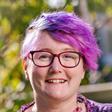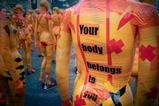When her marriage ended, Sally Hope felt she had lost her identity and began to question who she was without it.

In the wake of divorce I found myself repeatedly praying “I just don’t know who I am anymore”. Like many women I had built my identity around being a “wife” a “mother” and “a nice Christian woman who has it all together.” Suddenly I was no longer all of those things. Many well meaning Christian friends told me “your identity should be found in Christ” but this is a simplistic and naive line of thought.
I was a Christian, of course my identity was based in Christ, but being a daughter of God isn’t the sum total of my identity; nor should it be. God made me unique, he made me different from you, and you’re a daughter of God too. I needed to know what it was that made me, me.
Yes, I’m created, loved, saved, redeemed, my life is found in Christ, but so are billions of other people, and they’re not me. Who am I uniquely?
Yes, I’m created, loved, saved, redeemed, my life is found in Christ, but so are billions of other people, and they’re not me. Who am I uniquely? Who did God create me to be that he didn’t create you to be?
The Bible tells us that we all bear God’s image. I believe that God is so vast that it takes all of humanity to reflect them. Every single person must be wholly unique in order to reflect all of God. A diamond shimmers so brilliantly because it is multi-facetted; each part of the diamond reflects the light differently to all the others, hence it shines.
In the same way it is necessary for us all to reflect Christ in the way we were designed to, more than necessary, it is our created purpose to be the unique reflection of God that we were designed to be. How can we do that if we don’t know who we are?
My journey to answer this question was rooted in my faith but it also involved understanding what it means to be human, how exactly are our personalities shaped?
My journey to answer this question was rooted in my faith but it also involved understanding what it means to be human, how exactly are our personalities shaped?
As I rebuilt myself I considered how my natural personality traits had combined with my past experiences to shape the person I would become and I considered how much control I had over choosing how I would grow in the future. How could I become a better version of me and reflect Christ more beautifully?
Working as a Domestic Abuse support worker I found that I wasn’t the only woman to ask these important questions, and I learned that those who have a strong sense of self have more resilience and protection when they face adversities such as domestic abuse and other traumas. I began to pull together resources to help my clients work out who they really were and I developed recovery programmes that provided space for women to think about it.
Read more on identity
Who are you? Do you know your true identity?
God may be calling you to be ‘unuseful’, your identity isn’t in your busyness
Eventually, it became apparent to me that the tendency to identify ourselves by our relationships without fully understanding who we are as unique individuals, is something lots of women experience; not just those who have experienced abuse, not just those who have divorced and certainly not just Christian women. I realised that all women could benefit from the resources I was using to help hundreds of women a year step into their authentic selves.
This was why I created a journal that provides every reader with her own unique journey to self discovery. My book 30 Steps to Finding Yourself gently helps women to explore their own nature, their past experiences, their strengths and weaknesses, their vocation and how we can take control of those things to choose who we become. It looks at how we can find our own unique way to care for ourselves and thus how we can embrace our full, beautiful selves to be everything we were created to be.




































No comments yet